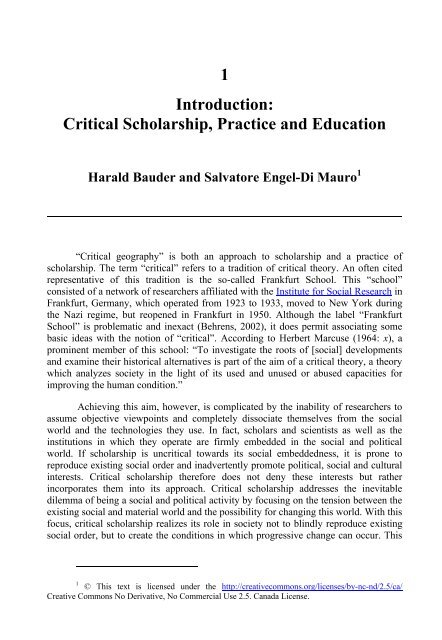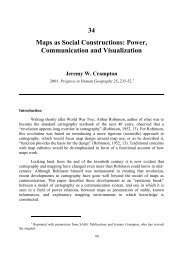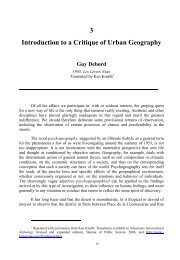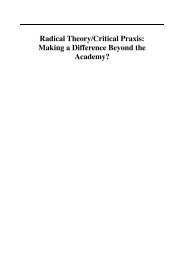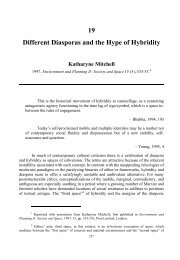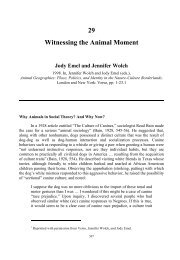- Page 1 and 2: CRITICAL GEOGRAPHIESA Collection of
- Page 3 and 4: Critical Geographies:A Collection o
- Page 5 and 6: Copyright © 2008 Harald Bauder and
- Page 8 and 9: 11 Revolutionary and Counter Revolu
- Page 10 and 11: Preface“Free Critical Geographies
- Page 12 and 13: the means to buy the book. Critical
- Page 14: AcknowledgementsWe thank the ACME C
- Page 17: PrefaceThe University of Georgia Pr
- Page 21 and 22: Introduction: Critical Scholarship,
- Page 23 and 24: Introduction: Critical Scholarship,
- Page 25 and 26: Part ICritical ReflectionsFun Fair
- Page 27 and 28: Part IThe difficulties with which t
- Page 29 and 30: What Geography Ought to BeIt was qu
- Page 31 and 32: What Geography Ought to Bethe lower
- Page 33: What Geography Ought to Bewould cor
- Page 36 and 37: Peter Kropotkinsettling their misun
- Page 38 and 39: Peter Kropotkineducation; but in th
- Page 40 and 41: 3Introduction to a Critique of Urba
- Page 42 and 43: Guy DebordIn accordance with what y
- Page 44 and 45: Guy DebordIn fact, nothing really n
- Page 46 and 47: Nicholas K. Blomleyand the democrat
- Page 48 and 49: Nicholas K. BlomleyFinally, West of
- Page 50 and 51: 5Reinventing Radical Geography:Is A
- Page 52 and 53: Vera Chouinardunless, of course, pa
- Page 54 and 55: Vera ChouinardReferencesBarnes, T.
- Page 56 and 57: 6The International Critical Geograp
- Page 58 and 59: Neil Smith and Caroline Desbienspar
- Page 60 and 61: Neil Smith and Caroline DesbiensSta
- Page 62 and 63: 7Reflections on a White DisciplineL
- Page 64 and 65: Laura PulidoUniversity of Wisconsin
- Page 66 and 67: Laura Pulidoeconomy of hazards (Hei
- Page 68 and 69:
Laura PulidoThe Whiteness of Geogra
- Page 70 and 71:
Laura Pulidothe diversification of
- Page 72 and 73:
Laura PulidoBowen, W., M. Salling a
- Page 74 and 75:
Laura PulidoKodras, J. nd. Race and
- Page 76 and 77:
Laura PulidoTowers, G. 2000. Applyi
- Page 78 and 79:
Harald Bauderreproduction (e.g. Bec
- Page 80 and 81:
Harald Bauderthinking about the aca
- Page 82 and 83:
Harald BauderThis strategy relies o
- Page 84 and 85:
Harald Bauderwww.aag.org/InternalUs
- Page 86:
Harald BauderWillis, P. E. 2004. Fo
- Page 91 and 92:
9A Voyage to New OrleansElisée Rec
- Page 93 and 94:
A Voyage to New OrleansThe mouth of
- Page 95 and 96:
A Voyage to New OrleansA light wind
- Page 97 and 98:
A Voyage to New OrleansGreat savann
- Page 99 and 100:
A Voyage to New OrleansNew OrleansT
- Page 101 and 102:
A Voyage to New Orleansfrom their m
- Page 103 and 104:
A Voyage to New Orleansor drowned i
- Page 105 and 106:
A Voyage to New OrleansAs for the p
- Page 107 and 108:
Geographic Models of ImperialismAfr
- Page 109 and 110:
Geographic Models of Imperialismsep
- Page 111 and 112:
Geographic Models of ImperialismivT
- Page 113 and 114:
Geographic Models of ImperialismSci
- Page 115 and 116:
Geographic Models of Imperialismbef
- Page 117 and 118:
Geographic Models of Imperialismcom
- Page 119 and 120:
Geographic Models of Imperialismtra
- Page 121 and 122:
Geographic Models of Imperialismind
- Page 123 and 124:
Geographic Models of ImperialismThe
- Page 125 and 126:
Geographic Models of ImperialismGue
- Page 127 and 128:
11Revolutionary and Counter Revolut
- Page 129 and 130:
Revolutionary and Counter Revolutio
- Page 131 and 132:
Revolutionary and Counter Revolutio
- Page 133 and 134:
Revolutionary and Counter Revolutio
- Page 135 and 136:
Revolutionary and Counter Revolutio
- Page 137 and 138:
Revolutionary and Counter Revolutio
- Page 139 and 140:
Revolutionary and Counter Revolutio
- Page 141 and 142:
Revolutionary and Counter Revolutio
- Page 143 and 144:
12Geopolitics and National Movement
- Page 145 and 146:
Geopolitics and National Movements:
- Page 147 and 148:
Geopolitics and National Movements:
- Page 149 and 150:
Geopolitics and National Movements:
- Page 151 and 152:
Geopolitics and National Movements:
- Page 153 and 154:
Geopolitics and National Movements:
- Page 155 and 156:
Geopolitics and National Movements:
- Page 157 and 158:
13The New Geography and the New Imp
- Page 159 and 160:
The New Geography and the New Imper
- Page 161 and 162:
The New Geography and the New Imper
- Page 163 and 164:
The New Geography and the New Imper
- Page 165 and 166:
The New Geography and the New Imper
- Page 167 and 168:
The New Geography and the New Imper
- Page 169 and 170:
The New Geography and the New Imper
- Page 171 and 172:
14The Geography of Human Liberation
- Page 173 and 174:
The Geography of Human LiberationBu
- Page 175 and 176:
The Geography of Human LiberationHo
- Page 177 and 178:
The Geography of Human LiberationSu
- Page 179 and 180:
The Geography of Human Liberationco
- Page 181 and 182:
The Geography of Human Liberationca
- Page 183 and 184:
The Geography of Human Liberationcu
- Page 185 and 186:
The Geography of Human Liberationco
- Page 187 and 188:
The Geography of Human Liberationel
- Page 189 and 190:
The Geography of Human Liberationco
- Page 191 and 192:
The Geography of Human Liberationim
- Page 193 and 194:
The Geography of Human Liberation
- Page 195 and 196:
The Geography of Human LiberationA
- Page 197 and 198:
The Geography of Human LiberationEn
- Page 199 and 200:
15A Socialist Feminist Perspective
- Page 201 and 202:
A Socialist Feminist Perspective on
- Page 203 and 204:
A Socialist Feminist Perspective on
- Page 205 and 206:
A Socialist Feminist Perspective on
- Page 207 and 208:
A Socialist Feminist Perspective on
- Page 209 and 210:
A Socialist Feminist Perspective on
- Page 211 and 212:
A Socialist Feminist Perspective on
- Page 213 and 214:
A Socialist Feminist Perspective on
- Page 215 and 216:
A Woman‟s Place?Extremely schemat
- Page 217 and 218:
A Woman‟s Place?These Durham mine
- Page 219 and 220:
A Woman‟s Place?This case happens
- Page 221 and 222:
A Woman‟s Place?presence/absence
- Page 223 and 224:
A Woman‟s Place?occurred in Lanca
- Page 225 and 226:
A Woman‟s Place?doubled since the
- Page 227 and 228:
A Woman‟s Place?Life has changed
- Page 229 and 230:
A Woman‟s Place?A Regional Proble
- Page 231 and 232:
A Woman‟s Place?of less individua
- Page 233 and 234:
A Woman‟s Place?haven‟t been ab
- Page 235 and 236:
17When in the World are Women?Janic
- Page 237 and 238:
When in the World are Women?of even
- Page 239 and 240:
When in the World are Women?As West
- Page 241 and 242:
When in the World are Women?As adva
- Page 243 and 244:
When in the World are Women?women i
- Page 245 and 246:
When in the World are Women?childre
- Page 247 and 248:
When in the World are Women?America
- Page 249 and 250:
When in the World are Women?current
- Page 251 and 252:
When in the World are Women?space d
- Page 253 and 254:
When in the World are Women?which w
- Page 255 and 256:
When in the World are Women?Katz, C
- Page 257 and 258:
When in the World are Women?UNICEF.
- Page 259 and 260:
Getting Personal: Reflexivity, Posi
- Page 261 and 262:
Getting Personal: Reflexivity, Posi
- Page 263 and 264:
Getting Personal: Reflexivity, Posi
- Page 265 and 266:
Getting Personal: Reflexivity, Posi
- Page 267 and 268:
Getting Personal: Reflexivity, Posi
- Page 269 and 270:
Getting Personal: Reflexivity, Posi
- Page 271 and 272:
Getting Personal: Reflexivity, Posi
- Page 273 and 274:
Getting Personal: Reflexivity, Posi
- Page 275 and 276:
Different Diasporas and the Hype of
- Page 277 and 278:
Different Diasporas and the Hype of
- Page 279 and 280:
Different Diasporas and the Hype of
- Page 281 and 282:
Different Diasporas and the Hype of
- Page 283 and 284:
Different Diasporas and the Hype of
- Page 285 and 286:
Different Diasporas and the Hype of
- Page 287 and 288:
Different Diasporas and the Hype of
- Page 289 and 290:
Different Diasporas and the Hype of
- Page 291 and 292:
Different Diasporas and the Hype of
- Page 293 and 294:
Different Diasporas and the Hype of
- Page 295 and 296:
20Critically Understanding Race-Con
- Page 297 and 298:
Critically Understanding Race-Conne
- Page 299 and 300:
Critically Understanding Race-Conne
- Page 301 and 302:
Critically Understanding Race-Conne
- Page 303 and 304:
Critically Understanding Race-Conne
- Page 305 and 306:
Critically Understanding Race-Conne
- Page 307 and 308:
Critically Understanding Race-Conne
- Page 309 and 310:
Critically Understanding Race-Conne
- Page 311 and 312:
Critically Understanding Race-Conne
- Page 313 and 314:
Critically Understanding Race-Conne
- Page 315 and 316:
Part IIIIn contrast to conventional
- Page 317 and 318:
Part IIIFitzsimmons, Margaret. 1989
- Page 319 and 320:
Does Radical Geography Lack an Appr
- Page 321 and 322:
Does Radical Geography Lack an Appr
- Page 323 and 324:
Does Radical Geography Lack an Appr
- Page 325 and 326:
Does Radical Geography Lack an Appr
- Page 327 and 328:
Does Radical Geography Lack an Appr
- Page 329 and 330:
Does Radical Geography Lack an Appr
- Page 331 and 332:
Does Radical Geography Lack an Appr
- Page 333 and 334:
Does Radical Geography Lack an Appr
- Page 335 and 336:
Does Radical Geography Lack an Appr
- Page 337 and 338:
Does Radical Geography Lack an Appr
- Page 339 and 340:
22Human-Environment Relations.Edito
- Page 341 and 342:
Human-Environment Relations. Editor
- Page 343 and 344:
Human-Environment Relations. Editor
- Page 345 and 346:
Human-Environment Relations. Editor
- Page 347 and 348:
Human-Environment Relations. Editor
- Page 349 and 350:
Human-Environment Relations. Editor
- Page 351 and 352:
Human-Environment Relations. Editor
- Page 353 and 354:
Human-Environment Relations. Editor
- Page 355 and 356:
Human-Environment Relations. Editor
- Page 357 and 358:
Human-Environment Relations. Editor
- Page 359 and 360:
Human-Environment Relations. Editor
- Page 361 and 362:
Human-Environment Relations. Editor
- Page 363 and 364:
Human-Environment Relations. Editor
- Page 365 and 366:
Hazards and Crisis: A Political Eco
- Page 367 and 368:
Hazards and Crisis: A Political Eco
- Page 369 and 370:
Hazards and Crisis: A Political Eco
- Page 371 and 372:
Hazards and Crisis: A Political Eco
- Page 373 and 374:
Hazards and Crisis: A Political Eco
- Page 375 and 376:
Hazards and Crisis: A Political Eco
- Page 377 and 378:
Hazards and Crisis: A Political Eco
- Page 379 and 380:
Hazards and Crisis: A Political Eco
- Page 381 and 382:
Hazards and Crisis: A Political Eco
- Page 383 and 384:
Hazards and Crisis: A Political Eco
- Page 385 and 386:
24The Production of NatureNeil Smit
- Page 387 and 388:
The Production of NatureThe place t
- Page 389 and 390:
The Production of Natureindirectly,
- Page 391 and 392:
The Production of Naturefamine or s
- Page 393 and 394:
The Production of Naturethat are ti
- Page 395 and 396:
The Production of Natureconceptuali
- Page 397 and 398:
The Production of Naturedirectly an
- Page 399 and 400:
The Production of Naturesecond labo
- Page 401 and 402:
The Production of Naturemode of pro
- Page 403 and 404:
The Production of Naturedespotism t
- Page 405 and 406:
The Production of Natureabstractnes
- Page 407 and 408:
The Production of NatureWhat is an
- Page 409 and 410:
The Production of Natureletter to K
- Page 411 and 412:
The Production of Natureproduction
- Page 413 and 414:
The Production of NatureThis is the
- Page 415 and 416:
The Production of Natureof things i
- Page 417 and 418:
The Production of NatureHegel, G.W.
- Page 419 and 420:
25Converting the Wetlands, Engender
- Page 421 and 422:
Converting the Wetlands, Engenderin
- Page 423 and 424:
Converting the Wetlands, Engenderin
- Page 425 and 426:
Converting the Wetlands, Engenderin
- Page 427 and 428:
Converting the Wetlands, Engenderin
- Page 429 and 430:
Converting the Wetlands, Engenderin
- Page 431 and 432:
Converting the Wetlands, Engenderin
- Page 433 and 434:
Converting the Wetlands, Engenderin
- Page 435 and 436:
Converting the Wetlands, Engenderin
- Page 437 and 438:
Converting the Wetlands, Engenderin
- Page 439 and 440:
Converting the Wetlands, Engenderin
- Page 441 and 442:
Converting the Wetlands, Engenderin
- Page 443 and 444:
Converting the Wetlands, Engenderin
- Page 445 and 446:
What’s the Problem Here?particula
- Page 447 and 448:
What’s the Problem Here?instituti
- Page 449 and 450:
What’s the Problem Here?The curre
- Page 451 and 452:
What’s the Problem Here?or ubiqui
- Page 453 and 454:
What’s the Problem Here?with litt
- Page 455 and 456:
What’s the Problem Here?Global de
- Page 457 and 458:
27Environmental Change and PolicyMe
- Page 459 and 460:
Environmental Change and PolicyOne
- Page 461 and 462:
Environmental Change and PolicyAtte
- Page 463 and 464:
Environmental Change and Policyabou
- Page 465 and 466:
Environmental Change and Policyscie
- Page 467 and 468:
Environmental Change and Policycomm
- Page 469 and 470:
Environmental Change and Policy“s
- Page 471 and 472:
Environmental Change and Policyfarm
- Page 473 and 474:
Environmental Change and Policyshap
- Page 475 and 476:
Environmental Change and Policyis t
- Page 477 and 478:
Environmental Change and PolicyThes
- Page 479 and 480:
Environmental Change and Policyreso
- Page 481 and 482:
Environmental Change and Policycomp
- Page 483 and 484:
Environmental Change and PolicyIt i
- Page 485 and 486:
Environmental Change and Policypref
- Page 487 and 488:
Environmental Change and PolicyCham
- Page 489 and 490:
Environmental Change and PolicyGidd
- Page 491 and 492:
Environmental Change and PolicyCons
- Page 493 and 494:
28A Walk on the Wild Side:A Critica
- Page 495 and 496:
A Walk on the Wild Side: A Critical
- Page 497 and 498:
A Walk on the Wild Side: A Critical
- Page 499 and 500:
A Walk on the Wild Side: A Critical
- Page 501 and 502:
A Walk on the Wild Side: A Critical
- Page 503 and 504:
A Walk on the Wild Side: A Critical
- Page 505 and 506:
A Walk on the Wild Side: A Critical
- Page 507 and 508:
A Walk on the Wild Side: A Critical
- Page 509 and 510:
A Walk on the Wild Side: A Critical
- Page 511 and 512:
A Walk on the Wild Side: A Critical
- Page 513 and 514:
A Walk on the Wild Side: A Critical
- Page 515 and 516:
A Walk on the Wild Side: A Critical
- Page 517 and 518:
A Walk on the Wild Side: A Critical
- Page 519 and 520:
A Walk on the Wild Side: A Critical
- Page 521 and 522:
A Walk on the Wild Side: A Critical
- Page 523 and 524:
A Walk on the Wild Side: A Critical
- Page 525 and 526:
Witnessing the Animal Momentacquire
- Page 527 and 528:
Witnessing the Animal MomentDavid B
- Page 529 and 530:
Witnessing the Animal Moment360,000
- Page 531 and 532:
Witnessing the Animal Momenthunt tr
- Page 533 and 534:
Witnessing the Animal Momentfarm an
- Page 535 and 536:
Witnessing the Animal Momentthe Ear
- Page 537 and 538:
Witnessing the Animal MomentAnimal
- Page 539 and 540:
Witnessing the Animal MomentCritiqu
- Page 541 and 542:
Witnessing the Animal MomentParty m
- Page 543 and 544:
Witnessing the Animal MomentDistrus
- Page 545 and 546:
Witnessing the Animal Momentand dea
- Page 547 and 548:
Witnessing the Animal MomentJohnsto
- Page 549 and 550:
30Rethinking Environmental Racism:W
- Page 551 and 552:
Rethinking Environmental Racism: Wh
- Page 553 and 554:
Racism and White PrivilegeRethinkin
- Page 555 and 556:
Rethinking Environmental Racism: Wh
- Page 557 and 558:
Rethinking Environmental Racism: Wh
- Page 559 and 560:
Rethinking Environmental Racism: Wh
- Page 561 and 562:
Rethinking Environmental Racism: Wh
- Page 563 and 564:
Rethinking Environmental Racism: Wh
- Page 565 and 566:
Rethinking Environmental Racism: Wh
- Page 567 and 568:
Rethinking Environmental Racism: Wh
- Page 569 and 570:
Rethinking Environmental Racism: Wh
- Page 571 and 572:
Rethinking Environmental Racism: Wh
- Page 573 and 574:
Rethinking Environmental Racism: Wh
- Page 575 and 576:
Rethinking Environmental Racism: Wh
- Page 577 and 578:
Rethinking Environmental Racism: Wh
- Page 579 and 580:
Rethinking Environmental Racism: Wh
- Page 581 and 582:
Rethinking Environmental Racism: Wh
- Page 583 and 584:
Rethinking Environmental Racism: Wh
- Page 585 and 586:
Rethinking Environmental Racism: Wh
- Page 587 and 588:
Rethinking Environmental Racism: Wh
- Page 589 and 590:
Rethinking Environmental Racism: Wh
- Page 591 and 592:
Rethinking Environmental Racism: Wh
- Page 593 and 594:
Rethinking Environmental Racism: Wh
- Page 595 and 596:
31Tracking Invasive Land Covers in
- Page 597 and 598:
Tracking Invasive Land Covers in In
- Page 599 and 600:
Tracking Invasive Land Covers in In
- Page 601 and 602:
Tracking Invasive Land Covers in In
- Page 603 and 604:
Tracking Invasive Land Covers in In
- Page 605 and 606:
Tracking Invasive Land Covers in In
- Page 607 and 608:
Tracking Invasive Land Covers in In
- Page 609 and 610:
Tracking Invasive Land Covers in In
- Page 611 and 612:
Tracking Invasive Land Covers in In
- Page 613 and 614:
Tracking Invasive Land Covers in In
- Page 615 and 616:
Tracking Invasive Land Covers in In
- Page 617 and 618:
Tracking Invasive Land Covers in In
- Page 619 and 620:
Tracking Invasive Land Covers in In
- Page 621 and 622:
Tracking Invasive Land Covers in In
- Page 623 and 624:
Tracking Invasive Land Covers in In
- Page 625 and 626:
Tracking Invasive Land Covers in In
- Page 627 and 628:
Tracking Invasive Land Covers in In
- Page 629 and 630:
Tracking Invasive Land Covers in In
- Page 631 and 632:
Tracking Invasive Land Covers in In
- Page 633 and 634:
Tracking Invasive Land Covers in In
- Page 635 and 636:
Part IVMaps are often taken as an u
- Page 637 and 638:
32An Illustration of Geographical W
- Page 639 and 640:
An Illustration of Geographical War
- Page 641 and 642:
An Illustration of Geographical War
- Page 643 and 644:
An Illustration of Geographical War
- Page 645 and 646:
An Illustration of Geographical War
- Page 647 and 648:
An Illustration of Geographical War
- Page 649 and 650:
An Illustration of Geographical War
- Page 651 and 652:
An Illustration of Geographical War
- Page 653 and 654:
An Illustration of Geographical War
- Page 655 and 656:
Representations in an Electronic Ag
- Page 657 and 658:
Representations in an Electronic Ag
- Page 659 and 660:
Representations in an Electronic Ag
- Page 661 and 662:
Representations in an Electronic Ag
- Page 663 and 664:
Representations in an Electronic Ag
- Page 665 and 666:
Representations in an Electronic Ag
- Page 667 and 668:
Representations in an Electronic Ag
- Page 669 and 670:
Representations in an Electronic Ag
- Page 671 and 672:
Representations in an Electronic Ag
- Page 673 and 674:
Representations in an Electronic Ag
- Page 675 and 676:
Representations in an Electronic Ag
- Page 677 and 678:
Representations in an Electronic Ag
- Page 679 and 680:
Representations in an Electronic Ag
- Page 681 and 682:
34Trouble in the Heartland:GIS and
- Page 683 and 684:
Trouble in the Heartland: GIS and I
- Page 685 and 686:
Trouble in the Heartland: GIS and I
- Page 687 and 688:
Trouble in the Heartland: GIS and I
- Page 689 and 690:
Trouble in the Heartland: GIS and I
- Page 691 and 692:
Trouble in the Heartland: GIS and I
- Page 693 and 694:
Trouble in the Heartland: GIS and I
- Page 695 and 696:
Trouble in the Heartland: GIS and I
- Page 697 and 698:
Trouble in the Heartland: GIS and I
- Page 699 and 700:
Trouble in the Heartland: GIS and I
- Page 701 and 702:
Trouble in the Heartland: GIS and I
- Page 703 and 704:
Trouble in the Heartland: GIS and I
- Page 705 and 706:
Trouble in the Heartland: GIS and I
- Page 707 and 708:
Trouble in the Heartland: GIS and I
- Page 709 and 710:
Maps as Social Constructions: Power
- Page 711 and 712:
Maps as Social Constructions: Power
- Page 713 and 714:
Maps as Social Constructions: Power
- Page 715 and 716:
Maps as Social Constructions: Power
- Page 717 and 718:
Maps as Social Constructions: Power
- Page 719 and 720:
Maps as Social Constructions: Power
- Page 721 and 722:
Maps as Social Constructions: Power
- Page 723 and 724:
Maps as Social Constructions: Power
- Page 725 and 726:
Maps as Social Constructions: Power
- Page 727 and 728:
Maps as Social Constructions: Power
- Page 729 and 730:
Putting “Cartography” into the
- Page 731 and 732:
Putting “Cartography” into the
- Page 733 and 734:
Putting “Cartography” into the
- Page 735 and 736:
Putting “Cartography” into the
- Page 737 and 738:
Putting “Cartography” into the
- Page 739 and 740:
Putting “Cartography” into the
- Page 741 and 742:
Putting “Cartography” into the
- Page 743 and 744:
Putting “Cartography” into the
- Page 745:
Putting “Cartography” into the


